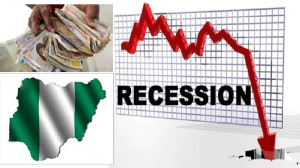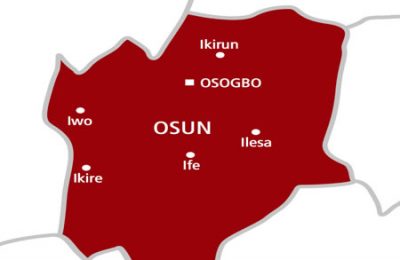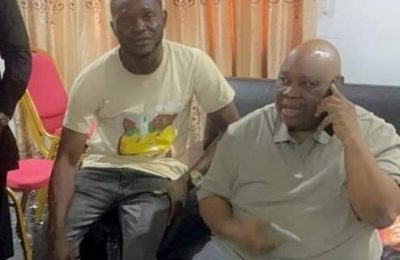
“In every community there is a class of people profoundly dangerous to the rest. I don’t mean criminals. For them we have punitive sanctions. I mean the leaders. Invariably, the most dangerous people seek power” – Saul Bellow, 1915-2015.
The Federal Government had a major role to play in the present predicament in which the nation finds itself.

But next time you hear a governor saying “all hands must be on deck”, then know you are listening to hogwash. They never mean it
The only hands they want on deck are those to help clear the cargo off the ship of state.

Shortly after President Muhammadu Buhari signed the Minimum Wage Bill into law in 2019, with instructions for “immediate implementation”, I placed my hands on deck.
From my own calculations, FG and states were set in motion for the financial crash we are all experiencing. So, I wrote a letter to two state governors; one belonging to the All Progressives Congress, APC, and the other Peoples’ Democratic Party, PDP. For some reason, Governors Fayemi, Ekiti, and Makinde, Oyo, appeared to me like two of the most astute among them; and they would listen.
I was wrong.
None of the two governors even acknowledged receipt of the letter. Today, they are all faced with the calamity I was aiming to avert.
Below, I reproduce portions of the letter privately sent to those wanting “all hands on deck”.
Like most of my writings, readers would be amazed by how predictive it was.
The letter was written on June 12, 2019 and sent by DHL and reads:
“From the attached copy of my article on Monday, June 10, 2019, it is obvious why I am writing to both of you.
“There is an important national issue – Minimum Wage – which needs to be handled carefully by all the governments of the Federation to avert dire economic consequences.
“I am happy that you represent the two major parties. That should remove any doubt about my political impartiality on this matter.
“Minimum Wage represents potential danger to every state – including those assuming that they can pay at the moment.
“Four major reasons account for that declaration.
- Timing is wrong. This year, the nation faces a drastic reduction in crude oil revenue which is the critical factor in the ability of the FG and states to pay the new minimum wage and still discharge other responsibilities to their people.
States now spending close to 70 per cent of their revenue paying salaries will need to borrow just to cover the new payroll bill. How can that be possible when crude oil revenue sharply declines? Most states are drowning under huge debt repayment already without this albatross around their necks.
- Virtually all institutions and organisations worldwide – World Bank, IMF, World Poverty Clock, Fitch etc – acting independently and appraising the prospects for Nigeria’s Gross Domestic Product, GDP, this year have arrived at the same conclusion. Nigeria’s GDP will grow by less than 2.5 per cent. That means lower per capita income and deepening poverty. That also precludes possibility for states to increase their Internally Generated Revenue, IGR, significantly to help pay the increased bill.
- Nature is not kind to us this year. Delayed rains will inevitably result in poor food harvest. I know that from what is happening in my farm. Governments will be better advised to anticipate demands for food donations from starving Nigerians late this year and early 2020. Herdsmen have not helped either.
- Heightened insecurity nationwide means only one thing – governors will be called upon to spend more on combating crimes in their states on a scale never before experienced in this country.
“Obviously, governments’ resources would have been stretched beyond limits without the added burden of Minimum Wage. For most, it is now an impossible task and the sooner all the governors realise this, the better”.
It was time for ‘siddon look’. It was certain to me that we were headed for a great economic catastrophe. But, who else could I contact; when my own “brothers” turned blind eyes to the warning?
WHAT WERE THE ISSUES AT STAKE?
“O! What a tangled web we weave/ When first we practice to deceive” – Sir Walter Scott, 1771-1832.
Governments have always deceived the people. Politicians care about the next election – not about national interest. The calamity unfolding received its greatest momentum a few days to the presidential election in 2019 when the Federal Government made an announcement; and my observations followed that announcement.
Let me take us back to recent Nigerian history to illustrate how dangerous our political leaders have become.
MINIMUM WAGE AND OUR PERPETUAL FAILURE TO BE PROACTIVE
“‘FG approves N30, 000 for its staff’.
‘National Council of States recommends N27, 000’ – AIT, January 23, 2019.
Insanity has been described by sages elsewhere as ‘doing the same thing all over again and expecting a different result.’
The last time the nation and coming elections were hostage to dispute over Minimum Wage negotiations, the President was Jonathan and the ruling party was the Peoples Democratic Party, PDP.
Then, as now, the Federal Government, FG, and state governments waited until the last few days to elections before hastily reaching an agreement. Suddenly, political leaders at federal and state levels, who had been lethargic about the matter, acted speedily to avert the consequences of failing to hold elections.
On January 22, 2019, the FG and the National Council of States, NCS, suddenly woke up to the fact that the request of the Organised Labour for a new Minimum Wage must be addressed. The FG approved N30, 000 for its staff and the NCS recommended N27, 000 apparently nationwide.
That the FG and NCS waited until another election is threatened demonstrates the collective inability of leaders to learn from previous mistakes. Some observations are pertinent in this regard because they point to the insincerity of leaders.
Governors and legislators will also soon cave in. But, they have not addressed the implementation of the new MW and how to fund it.”
That January 2019 article, published by this newspaper, ended with a prediction which is coming to pass right now.
This was the prophecy: “One thing is almost certain. The FG will probably send a hastily and badly drafted Minimum Wage Bill to the NASS; who, in turn, might either not work on it before the elections or hastily pass it to avoid being blamed for it. Governors and states Houses of Assembly will go through the same motion. Elections will hold. After that Labour will discover that it has been swindled. Few states will pay either N27, 000 or N30, 000. The crisis which governors predicted will occur soon enough – irrespective of who gets elected in February.”
Nigeria’s elected officials and the National Council of States – which includes all those who got us into this mess – approved Minimum Wage which could not be paid without dire consequences. President Buhari, confronted with protests by the governors, then approved a bailout of $2.1 billion for states. It was sugar-coated financial poison. And states were warned not to take it; because it will only encourage them to spend more on staff salaries than they could afford once the initial funds were exhausted. They are now exhausted and what is the result?
FISH ROTS FROM THE HEAD
“Don’t demand $2.1bn states’ debt payment, Tambuwal begs CBN.” News
What Buhari offered governors amounted to a bribe which enabled him to announce in January 2019, about 12 days to the presidential election, that the FG will pay N30, 000.
In actual fact, as early as 2017, it was clear that the FG could not afford to pay a hefty rise in Minimum Wage without resorting to unsustainable borrowing. By leading with a bad example, the FG used the $2.1 billion bailout to lure the states into the trap in which they now find themselves.
Even the richest five – Lagos, Rivers, Delta, Akwa Ibom and Kano – are now feeling the strain. The poorest five – Nasarawa, Gombe, Plateau, Ekiti and Ebonyi – merely collect revenue to pay salaries; they can hardly do anything more.
Now that Kano has reverted to N18, 000 wage; and Kaduna is retrenching several thousand employees, it is certain other states will soon follow.
They will retrench when the Central Bank of Nigeria, CBN, which is adamant, proceeds to deduct the loans they accepted in January 2019.
Unfortunately, there is no end in sight for the FG and states.
The N605billion, which was shared after the controversial N60 billion reportedly printed in March, will not solve their problems; even if sustained.
In 2018, Vice President Yemi Osinbajo, who was then the Chairman of the Economic Management Team, EMT, a task for which he was totally unfit, made the point that for the FG and states to discharge their responsibilities, at least N700billion a month would be needed for allocation.
Only once since then has that target been met.
And the Minimum Wage then was N18, 000 – which many states were not paying regularly.
The exchange rate averaged N340/US$1 then; and inflation was single digit.
But the price of crude oil and volume exported kept on trending downwards. Thus, even if Minimum Wage had remained at N18, 000, the FG and states would have had to spend an increasing percentage of their revenue on staff salaries and pensions.
Today, official exchange rate is N410/US$1 – if your bank can find the dollars.
Black market rates are tending towards N500/US$1. External loans now must be repaid with more naira per dollar than when the debts were incurred by myopic governments.
Buhari became President at a time most economists were already forecasting a recession.
Crude oil prices had fallen from over $100 to around $70; and heading South. As the major source of revenue, that should have provided all the warning signs a modern President needed to make the economy his first priority; to appoint a good Economic Adviser and to introduce strict austerity measures.
That is what well-educated leaders do when they assume office at a time like that.
Instead, Buhari appointed Osinbajo the Chairman of the Economic Management Team.
He did more to make the imminent recession worse.
One example will be sufficient to illustrate how fish rots from the head.
USA, China, Japan, Germany and Russia are among the world’s largest economies. None of the Presidents or Prime Ministers appointed more than 15 Ministers.
Buhari appointed 44.
On the average, capital expenditure in each country accounted for 70 per cent of the budget in the aggregate.
Buhari allocated less than 30 per cent to capital expenditure.
Ab initio, with that sort of Stone Age allocation of resources at the top, Nigeria’s fate was sealed.
The state governors followed Buhari’s bad example.
Everybody lived on loans easily approved by National and State Assemblies.
Mental laziness is yielding its inevitable dividends now. The FG and states are running out of money and more loans will only compound the problems.
The problems started as far back as 2013.
FG ROBBED STATES IN 2013; CRUDE PRICE WAS $102 FAAC CRISIS AND THE DANGERS AHEAD
“The Forum of Commissioners of Finance from the 36 states led by the Chairman, Mr Timothy Odaah, had expressed anger over the unpaid arrears amounting to about N160bn($1bn)” – PUNCH 19, 2013.”
Among the collateral damages which we can expect from the current situation is a halt to further allocation of funds to the Sovereign Wealth Fund, SWF, which involves saving excess crude revenue against any future drastic drop in crude oil income. While the price of crude continues to exceed the benchmark of $75 per barrel, the aggregate revenue falls far short of the projections. Right now, Nigeria’s crude sells at over $102 per barrel; that is 33% over the benchmark. But, shipments are down more than 36%.
In 2013, when the crude price was hovering around $102 per barrel, the states were already in trouble. The FG resorted to cheating, despite the positive variance between the benchmark price of $75 per barrel and the actual. Volume exported was far below budgeted quantity then. History is repeating itself now. Price of crude is well over benchmark, but the volume is far lower than the budget estimates. Inevitably, the states can expect less revenue at a time when prices are on an upward escalator on account of supply-side inflation now approaching 20 per cent. The end is not in sight.
Right now, the price of crude moves around $66 per barrel. But, with OPEC quota still in place, Nigeria cannot export the 2.3 million barrels per day on which the budget is based. We are limited by quota to 1.7 million barrels per day. That is bad enough. For reasons too numerous to explain now, our exports are well below the 1.7 million per day quota. Consequently, oil revenue in the first two months was well below estimates. Now we have the present financial crisis. And, it is resulting in predictable repercussions.
ANARCHY ON THE ECONOMIC FRONT
‘FG recorded N485.51bn fiscal deficit in January – CBN.’ News Report
‘Senate Okays Buhari’s $2.6bn External Loan Request.’ News Report
‘Nigeria’s trade deficit rises 49% to $2.5bn in January’. News Report
‘Capital importation drops 31%.’ News Report
‘Prices of rice, others rise in March – NBS.’ News Report
Anyone under the illusion that anarchy exists in the social/political fora of the Nigerian society needs to think again. There is as much disarray on the economic front.
It is chaotic and getting worse on matters economic. Until recently, the CBN was in firm control of the monetary policy. But, the Central Bank is now overwhelmed with problems created largely by the managers of fiscal policy – Buhari, Osinbajo, Hajia Zainab Ahmed etc. They have driven the nation into an economic quagmire – from which escape is not in sight soon. Things will get a lot worse before they get better. From the reports above, permit me to illustrate why things will get worse; with food prices which are now going through the roof; and reaching for the sky.
“On a daily basis, bandits would abduct no fewer than 16 villagers and we continue to pay ransom for them. Tell Buhari, we no longer go to farm because of bandits” – A resident of Sabon Birnin in Kaduna State, Dan Masamin, April 22, 2021.
Anyone who thinks that statement is an isolated one should go to the farms in any northern and some southern states to see farms abandoned. My recent train ride from Lagos to Ibadan revealed several farms with no farmers to work there. Nothing can prevent mass starvation, starting with the farmers, this year; and food prices will continue to rise.
PRINTED N60BN; TEMPEST IN A TEAPOT
You can generally determine how serious political and social leaders in any country are by observing what they argue about. The palaver of the moment is the N60 billion said to have been printed by the Central Bank of Nigeria – which the bank denies. The controversy is a waste of everybody’s time.
The CBN, as part of its functions, prints money all the time. And, it is the FG’s lender of last resort. It lends government money when sudden shortfalls occur. And, it is neither illegal nor improper. The CBN should have ignored Governor Obaseki.
The Minister of Finance, after admitting a short-fall of N55bn, which was topped up to reach N605bn, failed to disclose where the money came from – lending credence to the charge of printing.
The most disturbing aspect was the frenzy following the N60bn supposedly printed. It is 0.005 of the currency in circulation; and cannot trigger the sort of inflation critics suggest. More valid is the question: For how long will the FG have to continue to top up? Otherwise monthly allocations might remain under N600bn. That spells disaster.
WHAT TO EXPECT
THIS YEAR
Let me summarise the forecasts for the rest of 2021 in bullet points.
- Expect stagflation; meaning low economic growth and high inflation, perhaps up to 30 per cent
- Massive retrenchment of workers in public and private sectors
- Declining exchange rates; perhaps as much as N550/US$1
- More loans and higher debt-to-revenue ratio.
- Deepening poverty
- Massive hunger
- Another recession is on the way
Advertise or Publish a Story on Nationnewslead: Kindly contact us @ Nationnewslead@gmail.com Call or Whatsapp: 08168544205, 07055577376







